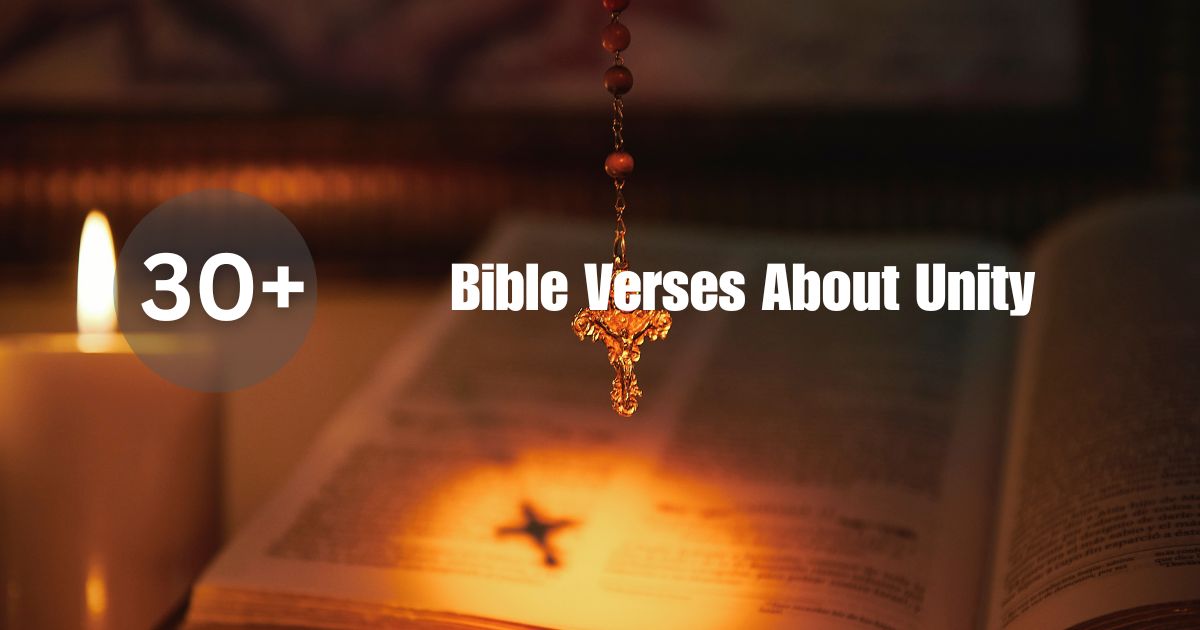Unity is something we all long for, yet many of us struggle to experience it in real life. I believe the desire to stand together, whether in faith, family, or community, often clashes with pride, misunderstandings, or personal differences. It can feel painful when division weakens relationships that should be strong. In my experience, those moments remind us how deeply we need wisdom and guidance that brings people closer instead of driving them apart.
When I think about unity, I see it as more than agreement. It is a bond that grows through love, patience, and a shared purpose. I have learned that true unity carries peace and strength that no individual effort can create alone. That is why turning to scripture on Unity matters, because it speaks to our struggles with real answers that inspire harmony where it feels hardest to find.
What Does The Bible Say About Unity?
The Bible teaches that unity is a gift from God and a calling for His people. In Psalm 133:1, it says, “How good and pleasant it is when God’s people live together in unity.” This shows that unity brings joy, peace, and blessings when believers walk together with one purpose.
Jesus also prayed for unity among His followers. In John 17:21, He prayed, “That all of them may be one, Father, just as you are in me and I am in you.” This verse reminds us that unity is not just about agreement but about reflecting the love and oneness of God in our relationships.
The List Of Bible Verses About Unity & Scriptures on Unity
Psalm 133:1
“How good and pleasant it is when God’s people live together in unity.”
- Meaning: This verse celebrates unity among believers as a blessing from God. It highlights the joy and goodness that flow when people live in harmony.
- Context: Written by David, this psalm likely reflects moments when Israel gathered for worship. It reminded God’s people that unity was not only desirable but sacred.
- Practical Application: True unity strengthens relationships in families, churches, and communities. In my experience, when people set aside pride and choose peace, life becomes more joyful and fulfilling.
John 17:21
“That all of them may be one, Father, just as you are in me and I am in you. May they also be in us so that the world may believe that you have sent me.”
- Meaning: Jesus prayed for His followers to be united just as He and the Father are one. This kind of unity becomes a testimony to the world of God’s truth.
- Context: These words are from Christ’s prayer before His crucifixion. He longed for His disciples to reflect divine unity so the gospel could spread with power.
- Practical Application: Believers today can show the love of Christ through unity. When Christians avoid division and work together, the world sees a living witness of God’s grace.
Ephesians 4:3
“Make every effort to keep the unity of the Spirit through the bond of peace.”
- Meaning: Unity is not automatic; it requires effort. The Spirit creates unity, but believers must guard and preserve it.
- Context: Paul wrote to the Ephesian church urging them to walk in humility, patience, and love to maintain peace in the body of Christ.
- Practical Application: In daily life, unity means choosing peace over conflict. I believe small acts of patience and kindness can protect relationships and build lasting harmony.
1 Corinthians 1:10
- “I appeal to you, brothers and sisters, in the name of our Lord Jesus Christ, that all of you agree with one another in what you say and that there be no divisions among you, but that you be perfectly united in mind and thought.”
- Meaning: Paul urged the church to avoid division and stand together in faith and doctrine.
- Context: The Corinthian church struggled with factions and disagreements. Paul addressed these issues early in his letter to restore unity among believers.
- Practical Application: Unity does not mean uniformity, but it does require shared commitment to Christ. In my experience, focusing on the gospel instead of personal preferences keeps relationships strong.
Colossians 3:14
“And over all these virtues put on love, which binds them all together in perfect unity.”
- Meaning: Love is the essential virtue that ties all others together, making unity possible.
- Context: Paul emphasized the importance of Christian virtues such as compassion and patience, but he placed love above them all as the true bond.
- Practical Application: Love holds people together even when differences arise. Choosing love in marriage, friendship, or church life often resolves conflicts that words alone cannot.
Romans 12:4–5
“For just as each of us has one body with many members, and these members do not all have the same function, so in Christ we, though many, form one body, and each member belongs to all the others.”
- Meaning: Paul compared believers to parts of one body, each with different roles but united under Christ.
- Context: Writing to Roman Christians, Paul reminded them that diversity of gifts should not cause division but strengthen unity.
- Practical Application: Every person has value and purpose in God’s kingdom. I think recognizing the unique gifts of others helps us appreciate unity instead of competing.
Philippians 2:2
“Then make my joy complete by being like-minded, having the same love, being one in spirit and of one mind.”
- Meaning: Paul expressed joy in seeing believers united in heart and purpose.
- Context: In his letter from prison, Paul urged the Philippian church to put aside selfish ambition and embrace humility for the sake of unity.
- Practical Application: Unity grows when people share the same love and goals. In real life, I find teamwork flourishes when everyone commits to the same mission with selfless love.
1 Peter 3:8
“Finally, all of you, be like-minded, be sympathetic, love one another, be compassionate and humble.”
- Meaning: Peter urged believers to embody qualities that naturally create unity.
- Context: Early Christians faced persecution, so harmony among them was vital for strength and survival.
- Practical Application: Humility and compassion are the foundation of unity. I believe that practicing empathy and kindness is one of the most powerful ways to keep relationships whole.
1 Corinthians 12:12
“Just as a body, though one, has many parts, but all its many parts form one body, so it is with Christ.”
- Meaning: Believers are diverse, yet together they form one unified body in Christ.
- Context: Paul explained spiritual gifts and reminded the Corinthians that each believer, though different, plays a vital role in the body of Christ.
- Practical Application: Unity celebrates diversity. Instead of competing, we are stronger when each person contributes their God-given gifts to the community.
Galatians 3:28
“There is neither Jew nor Gentile, neither slave nor free, nor is there male and female, for you are all one in Christ Jesus.”
- Meaning: In Christ, all divisions based on culture, status, or gender are erased. True unity is found in Him.
- Context: Paul addressed the Galatians’ struggles with legalism and cultural barriers, showing that faith in Christ unites all believers.
- Practical Application: Unity comes when we stop judging by outward labels and see each other through Christ. I think embracing equality in the church and community reflects God’s heart.
Find Out More >>> 30+ Powerful Bible Verses About Communication
John 13:35
“By this everyone will know that you are my disciples, if you love one another.”
- Meaning: True discipleship is proven through love. Unity flows from genuine love expressed among believers.
- Context: Jesus spoke these words to His disciples during the Last Supper, teaching them that love would be the defining mark of His followers.
- Practical Application: Unity is not built on agreements alone but on love that is visible. In daily life, showing kindness and care toward others strengthens bonds and displays Christ to the world.
Romans 15:5–6
“May the God who gives endurance and encouragement give you the same attitude of mind toward each other that Christ Jesus had, so that with one mind and one voice you may glorify the God and Father of our Lord Jesus Christ.”
- Meaning: Unity of mind and spirit allows believers to glorify God together. Harmony is a gift that comes from God.
- Context: Paul wrote to the Roman church, urging unity between Jewish and Gentile believers who faced cultural and spiritual differences.
- Practical Application: Pray for the same spirit of unity in your family, church, or community. When people speak and act with one heart, God is honored above all.
Ephesians 4:13
“Until we all reach unity in the faith and in the knowledge of the Son of God and become mature, attaining to the whole measure of the fullness of Christ.”
- Meaning: Unity is tied to spiritual maturity and a deeper understanding of Christ. Growth in faith brings believers closer together.
- Context: Paul was teaching about the role of spiritual leaders in equipping the church, emphasizing maturity and unity as essential goals.
- Practical Application: Pursue spiritual growth through study, prayer, and fellowship. The stronger you become in faith, the more you will strengthen the unity of the whole body of Christ.
Acts 4:32
“All the believers were one in heart and mind. No one claimed that any of their possessions was their own, but they shared everything they had.”
- Meaning: True unity results in selflessness and generosity. Believers lived as one, supporting and caring for each other.
- Context: This describes the early church after Pentecost, where the Holy Spirit brought believers into deep unity and community living.
- Practical Application: Unity calls us to share not only spiritual encouragement but also practical support. Look for ways to help others by meeting their needs with love.
1 Corinthians 12:25
“So that there should be no division in the body, but that its parts should have equal concern for each other.”
- Meaning: Unity means valuing every person equally, avoiding division, and showing genuine concern for one another.
- Context: Paul used the metaphor of the human body to explain how every believer has a role in the church, stressing equality and interdependence.
- Practical Application: Treat others in your community or church as vital parts of one body. Show compassion and honor to everyone, regardless of their role or status.
Ephesians 2:14
“For he himself is our peace, who has made the two groups one and has destroyed the barrier, the dividing wall of hostility.”
- Meaning: Christ brings peace by breaking down divisions. His sacrifice unites people who were once separated.
- Context: Paul addressed Jewish and Gentile believers, teaching that Jesus ended hostility by reconciling them into one body.
- Practical Application:
Seek peace in relationships by following Christ’s example. True unity comes when barriers of pride and division are removed.
2 Chronicles 30:12
“Also in Judah the hand of God was on the people to give them unity of mind to carry out what the king and the officials had ordered, following the word of the Lord.”
- Meaning: Unity is a gift from God that empowers His people to act together in obedience.
- Context: During King Hezekiah’s reforms, God moved the hearts of the people to act as one in returning to Him.
- Practical Application: Pray for God to create unity in your community. When hearts are aligned with His word, collective obedience becomes possible.
1 Thessalonians 5:13
“Hold them in the highest regard in love because of their work. Live in peace with each other.”
- Meaning: Unity flourishes when leaders are respected and believers live in peace together.
- Context: Paul encouraged the Thessalonian church to honor their leaders and maintain harmony within the body of Christ.
- Practical Application: Respect those who serve and guide you in faith. A spirit of love and peace strengthens unity in the church.
1 Corinthians 3:9
“For we are co-workers in God’s service; you are God’s field, God’s building.”
- Meaning: Unity is found in working together for God’s kingdom. Every believer shares the same purpose.
- Context: Paul reminded the Corinthians that leaders like himself and Apollos were not rivals but co-laborers serving God.
- Practical Application: Focus on serving God together rather than competing. Recognize that unity in service builds up the entire community.
Hebrews 10:24–25
“And let us consider how we may spur one another on toward love and good deeds, not giving up meeting together, as some are in the habit of doing, but encouraging one another.”
- Meaning: Unity grows when believers inspire each other in faith and stay committed to fellowship.
- Context: The writer of Hebrews encouraged perseverance by reminding Christians of the importance of gathering together.
- Practical Application: Stay connected to your faith community. Meeting together regularly builds encouragement, accountability, and stronger unity.
1 John 1:7
“But if we walk in the light, as he is in the light, we have fellowship with one another, and the blood of Jesus, his Son, purifies us from all sin.”
- Meaning: Walking in the light of Christ unites believers through shared fellowship and forgiveness. Unity is built on purity and truth.
- Context: John wrote this letter to emphasize living in God’s truth, showing that real fellowship with one another comes from walking with Him.
- Practical Application: Live with honesty and integrity. When believers walk in truth, unity and trust naturally grow stronger in their relationships.
Ecclesiastes 4:9–10
“Two are better than one, because they have a good return for their labor: If either of them falls down, one can help the other up.”
- Meaning: Unity makes people stronger together than apart. Companionship provides support, encouragement, and resilience.
- Context: Solomon observed the value of partnership, teaching that life is best lived with others rather than in isolation.
- Practical Application: Do not face challenges alone. Seek and offer support in your family, friendships, and church to walk through life’s struggles together.
1 Corinthians 12:26
“If one part suffers, every part suffers with it; if one part is honored, every part rejoices with it.”
- Meaning: Unity means sharing both burdens and joys. The well-being of one affects the entire body.
- Context: Paul described the church as the body of Christ, where every member is interconnected and important.
- Practical Application: Show empathy and celebrate others. Whether in sorrow or joy, standing together strengthens unity and builds lasting bonds.
Romans 14:19
“Let us therefore make every effort to do what leads to peace and to mutual edification.”
- Meaning: Unity thrives when believers actively pursue peace and build one another up.
- Context: Paul addressed disputes over personal convictions, urging Christians not to let differences destroy fellowship.
- Practical Application: Focus on encouraging and uplifting others. Choose words and actions that promote peace rather than division.
Philippians 1:27
“Whatever happens, conduct yourselves in a manner worthy of the gospel of Christ. Then, whether I come and see you or only hear about you in my absence, I will know that you stand firm in the one Spirit, striving together as one for the faith of the gospel.”
- Meaning: Unity in faith is essential to living in a way that honors Christ. Believers must strive together, not separately.
- Context: Paul wrote from prison to the Philippians, urging them to remain steadfast in unity regardless of challenges.
- Practical Application: Stand firm in your faith alongside others. Working together for the gospel strengthens the church and glorifies God.
1 Corinthians 12:27
“Now you are the body of Christ, and each one of you is a part of it.”
- Meaning: Every believer has a role in the unity of the body of Christ. No one is without purpose or value.
- Context: Paul reminded the Corinthians that though diverse in gifts, they formed one united body under Christ.
- Practical Application: Recognize your role in the church community. Unity grows when everyone uses their gifts to serve and support one another.
Amos 3:3
“Do two walk together unless they have agreed to do so.”
- Meaning: Unity requires agreement and shared purpose. Without alignment, true fellowship cannot exist.
- Context: Amos questioned Israel’s relationship with God, showing that partnership requires agreement in values and direction.
- Practical Application: Build unity by seeking common ground and shared purpose with others. Agreement strengthens relationships and joint efforts.
Zephaniah 3:9
“Then I will purify the lips of the peoples, that all of them may call on the name of the Lord and serve him shoulder to shoulder.”
- Meaning: God’s plan for unity includes people from every nation serving Him together in harmony.
- Context: Zephaniah prophesied about a future time when nations would be restored to serve God in unity.
- Practical Application: Embrace diversity in your faith community. Unity grows when believers from different backgrounds join in serving God together.
Matthew 18:20
“For where two or three gather in my name, there am I with them.”
- Meaning: Christ is present when believers unite in His name. Unity invites His presence.
- Context: Jesus assured His disciples that His authority and presence would be with them when gathered in agreement.
- Practical Application: Gather with others in prayer and worship. Even small groups experience the power of unity through Christ’s presence.
Ephesians 4:16
“From him the whole body, joined and held together by every supporting ligament, grows and builds itself up in love, as each part does its work.”
- Meaning: Unity is sustained through love and cooperation. Every believer contributes to the health of the whole body.
- Context: Paul used the body metaphor to describe how Christ unites and strengthens the church through each member.
- Practical Application: Do your part faithfully in your community of faith. Unity grows stronger when everyone works together in love.
Romans 15:7
“Accept one another, then, just as Christ accepted you, in order to bring praise to God.”
- Meaning: Unity grows when believers welcome one another with love and grace, reflecting the acceptance of Christ.
- Context: Paul wrote to the Roman church, which had both Jewish and Gentile believers, urging them to embrace each other despite differences.
- Practical Application: Practice acceptance in your community. When you welcome others without judgment, you strengthen unity and glorify God.
1 Peter 4:10
“Each of you should use whatever gift you have received to serve others, as faithful stewards of God’s grace in its various forms.”
- Meaning: Unity is strengthened when believers use their gifts to serve one another. Every gift contributes to the whole body.
- Context: Peter encouraged Christians facing hardship to live out their faith by serving each other faithfully.
- Practical Application: Discover your God-given gifts and use them for others. Serving with humility builds stronger unity in the church.
Matthew 23:8
“But you are not to be called ‘Rabbi,’ for you have one Teacher, and you are all brothers.”
- Meaning: True unity comes from equality under Christ. No believer stands above another in God’s family.
- Context: Jesus warned against pride and titles among the religious leaders, reminding His followers of their shared brotherhood.
- Practical Application: Reject pride and superiority. Remember that all believers are equal before Christ, and unity grows in humility.
Colossians 2:2
“My goal is that they may be encouraged in heart and united in love, so that they may have the full riches of complete understanding.”
- Meaning: Unity in love opens the door to deeper spiritual understanding and encouragement.
- Context: Paul wrote to the Colossians about the mystery of Christ, emphasizing unity as key to growing in wisdom and knowledge.
- Practical Application: Pursue love in your relationships. When believers are united in love, their faith grows stronger and richer.
2 Corinthians 13:11
“Finally, brothers and sisters, rejoice. Strive for full restoration, encourage one another, be of one mind, live in peace. And the God of love and peace will be with you.”
- Meaning: Unity is marked by restoration, encouragement, peace, and shared joy.
- Context: Paul closed his letter urging the Corinthians to pursue harmony after times of conflict and division.
- Practical Application: Seek peace and restoration in broken relationships. Unity grows when believers encourage each other and live in harmony.
Isaiah 52:8
“Listen! Your watchmen lift up their voices; together they shout for joy. When the Lord returns to Zion, they will see it with their own eyes.”
- Meaning: Unity is expressed in collective joy and worship when God brings deliverance.
- Context: Isaiah described the joy of God’s people when they witness His return to Zion with salvation.
- Practical Application: Celebrate God’s goodness together. Shared worship and thanksgiving unite believers in joy and hope.
Malachi 2:10
“Do we not all have one Father? Did not one God create us? Why do we profane the covenant of our ancestors by being unfaithful to one another?”
- Meaning: Unity is rooted in recognizing God as our common Father and Creator. Division dishonors Him.
- Context: Malachi rebuked the people of Israel for breaking faith with one another and dishonoring God’s covenant.
- Practical Application: Remember that all people share one Creator. Treat others with faithfulness and respect to honor God and maintain unity.
Philippians 2:4
“Not looking to your own interests but each of you to the interests of the others.”
- Meaning: Unity grows when believers put the needs of others above their own.
- Context: Paul urged the Philippians to live in humility and selflessness, reflecting the mindset of Christ.
- Practical Application: Practice selflessness in your relationships. Looking out for others creates bonds of love and unity.
Colossians 3:15
“Let the peace of Christ rule in your hearts, since as members of one body you were called to peace. And be thankful.”
- Meaning: Unity is preserved when Christ’s peace governs the hearts of believers.
- Context: Paul encouraged the Colossians to live as one body, letting Christ’s peace define their relationships.
- Practical Application: Choose peace in conflicts. When Christ rules your heart, you help create a united and thankful community.
2 Peter 1:5–7
“For this very reason, make every effort to add to your faith goodness; and to goodness, knowledge; and to knowledge, self-control; and to self-control, perseverance; and to perseverance, godliness; and to godliness, mutual affection; and to mutual affection, love.”
- Meaning: Unity thrives when believers grow in character and love, building strong bonds of mutual affection.
- Context: Peter listed qualities of spiritual growth, showing that love and affection are the ultimate expressions of faith.
- Practical Application: Strive for personal growth in faith and character. The more you grow in love, the more you strengthen unity in your relationships.
Read More >>> 30+ Powerful Bible Verses About Food
Conclusion
Unity is one of the greatest strengths that brings people together in faith and love. These Bible Verses About Unity remind us that God calls us to live in harmony, serve one another, and walk in peace as members of one body. They show that unity is not only a command but also a blessing that reflects the heart of God.
By reflecting on these verses, you have seen how scripture guides us to set aside selfishness and embrace a spirit of togetherness. The message is clear and timeless: when we live in unity, we honor God and build stronger relationships. May these words inspire you to nurture peace and love in your daily life.

I’m Roman, the author of starspotlights.com. I collect clear Bible verses and give short, easy explanations. My goal is to make Scripture simple for everyone — beginners, busy people, and anyone who wants to learn.










